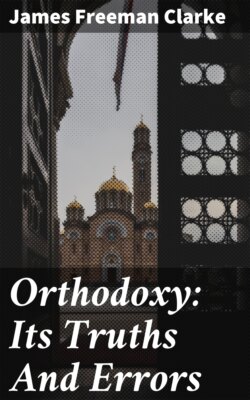Читать книгу Orthodoxy: Its Truths And Errors - James Freeman Clarke - Страница 18
На сайте Литреса книга снята с продажи.
§ 1. Meaning of Natural and Supernatural.
ОглавлениеTable of Contents
Orthodox Christianity claims that Christianity is a supernatural revelation, consisting of truths revealed by God, not according to the method of nature, but outside of it. But not merely the orthodox, the heterodox too, Unitarians, Universalists, Quakers, Swedenborgians, all hold to Christianity as a supernatural faith. What do they mean by this, and why do they insist on it so strongly? This is our first question, and the next will be, “What do those who hold to naturalism mean by it, and why do they insist on their view?”
The distinction between the two seems to be this: The naturalists in theology assert that God comes to man through nature, and nature only; the supernaturalist declares that God comes to man, not only through nature, but also by other methods outside of nature, or above nature. There is no question between them as to natural religion. Both admit that; supernaturalists believe all that naturalists believe, only they believe something more.
But how is nature to be defined? What is meant by nature? Various definitions are given; but we wish for one now which shall really express the issue taken in this controversy. So we may define nature as law. All the nexus or web of existing substances and forces which are under law belong to nature. All that happens outside of these laws is either preternatural, unnatural, subternatural, or [pg 044] supernatural. If it is something outside of law, but not violating it, nor coming from a higher source, we call it preternatural; like magic, ghosts, sorcery, fairies, genii, and the like. What violates law is unnatural. What is so low down that it lies below law, as chaos before creation; or nebulous matter not yet beginning to obey the law of gravitation; or intelligences, like Mephistopheles or Satan, who have sunk so low in sin as to have lost the perception of right and wrong, is subternatural, below nature. What belongs to a religion above the laws of time and space, above the finite, is supernatural.
Thus brutes, and men like brutes, who are below the moral law, are subternatural as regards that law. We do not call it a sin in a tiger to kill a man, for he is below law as regards sin. He is below the moral law. Again, we can conceive of angels so high up as to be above the moral law, in part of its domain, not capable either of common virtue or of common sin, according to our standards of morality, though perhaps under some higher code of ethics. They are supernatural beings as regards that law—the moral law of this world. As regards some parts of the moral law, there are, no doubt, multitudes of human beings above it even in this world. There are many persons quite incapable of swearing, lying, stealing, getting drunk, flying into a passion, and to whom, therefore, it is no virtue to avoid these vices. They are simply above that part of the moral law. They are supernatural beings as respects that part of human character.
After these illustrations, we can see what is meant by supernaturalism. If there is anything in this world which comes from above the world, and not from the existing laws of being, that is supernatural.
